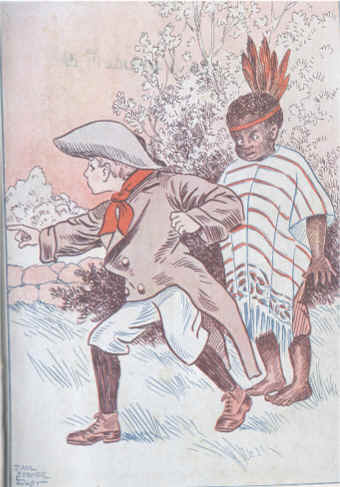|
LITTLE WASHINGTONS SERIES |
|
|
Notes |
Titles |
|
"This series presents early American history in a
manner that impresses the young readers. Because of George and Martha
Washington Parke, two young descendants of the famous General Washington,
these stories follow exactly the life of the great American, by means of
playing they act the life of the Washingtons, both in battles and in
society."
The premise of this series is contrived, and on the face of it seems to promise more of education than entertainment: four children, siblings Martha and George Parke; Jim, the son of their cook; and John, their neighbor, are big fans of George Washington. Their greatest pleasure is to read detailed histories of his life and then act them out. So, when I picked up "The Little Washingtons: Farmers", I anticipated an entertaining history lesson, a sort of Henty story for the smaller fry. I was disappointed: the Parke children randomly open the Washington biography (like the "Bible-cracking" method of divination) and read, then act out, whatever is on the page that they open. Since this series is masquerading as an educational one, I thought that they'd be likely to open the page to something exciting or historically momentous -- the crossing of the Delaware, a great battle, some important episode of his presidency -- but, unfortunately, they always (with one startling exception) seem to hit on some dry-as-dust paragraph about, say, Washington's preferred breed of sheep, or his fondness for corn-cakes as a hunting breakfast. Each "acting out" episode climaxes in someone falling into the lake, falling off a cow, falling out of a wagon, and so forth. One of the four playmates, Jim, is black. Although Jim lives with the Parkes and they are apparently his constant playmates, he nevertheless seems to have acquired a peculiar, Elmer Fuddian version of the standard series book "black dialect". Perhaps the Parkes secured a special speech tutor for him. At any rate, Jim is treated by the other children as an equal; and, indeed, is portrayed throughout the book as being stronger, more honest, and possessed of more common sense than the selfish, pettish George Parke. It is startling, then, to read the casually imparted information, near the end of the book, that Jim could not read or write. The episode where the children play at being Washington's slaves will make modern readers cringe. As in her "Polly Brewster" books, one of the hallmarks of Roy's writing is an earnest effort to slip "scientific" facts into the narrative. The factoids tend to be of a rather dubious and peculiar nature. In "Farmers", for example, we learn that "Nature never meant a cow to have horns; in fact, a cow is not one of Nature's manufactures... She is what they call a cross-bred animal, with a reindeer for a father and a tame milk-giving beast for a mother." Disappointingly, the Little Washingtons series doesn't
contain the strange discursions into the realms of aesthetics, metaphysics,
and sociology which are one of the Polly books' chief charms. |
(1) THE LITTLE WASHINGTONS -- "Their thrilling battles and expeditions generally end in "punishment" lessons read by Mrs. Parke from the "Life of Washington." The culprits listen intently, for this reading generally gives them new ideas for further games of Indian warfare and Colonists' battles."* -- 1918. Grosset & Dunlap. (2) THE LITTLE WASHINGTONS' RELATIVES -- "The Davis children visit the Parke home and join zealously in the games of playing General Washington. So zealously, in fact, that little Jim almost loses his scalp."* --1918, 1925. Grosset & Dunlap. (3) THE LITTLE WASHINGTONS' TRAVELS -- "The children wage a fierce battle upon the roof of a hotel in New York City. Then, visiting the Davis home in Philadelphia, the patriotic Washingtons vanquish the Hessians on a battle-field in the empty lot back of the Davis property."* -- 1918, 1925. Grosset & Dunlap. (4) THE LITTLE WASHINGTONS AT SCHOOL -- "After the school-house battle, the Washingtons discover a band of gypsies camping near the back road to their homes and incidentally they secure the stolen horse which the gypsies had taken from the "butter and egg farmer" of the Parkes."* -- 1920. Grosset & Dunlap. (5) THE LITTLE WASHINGTONS' HOLIDAYS -- "They spend a pleasant summer on two adjoining farms in Vermont. During the voyage they try to capture a "frigate" but little Jim is caught and about to be punished by the Captain when his confederates hasten in and save him."* -- 1925. Grosset & Dunlap. (6) THE LITTLE WASHINGTONS: FARMERS -- 1926. Grosset & Dunlap -- The children visit the farm of Mr. Vernon (or, Mr. "Wernon", to Jim) where they proceed to have a series of boring adventures, each of which culminates in something, or someone, falling. (7) THE LITTLE WASHINGTONS' PARTIES -- This seems to be a phantom title.
|
|
Source: *Advertisement in Little Jack Rabbit and Danny Fox, by David Cory, ill. by H.S. Barbour. 1921. Grosset & Dunlap. New York WorldCat Holdings |
